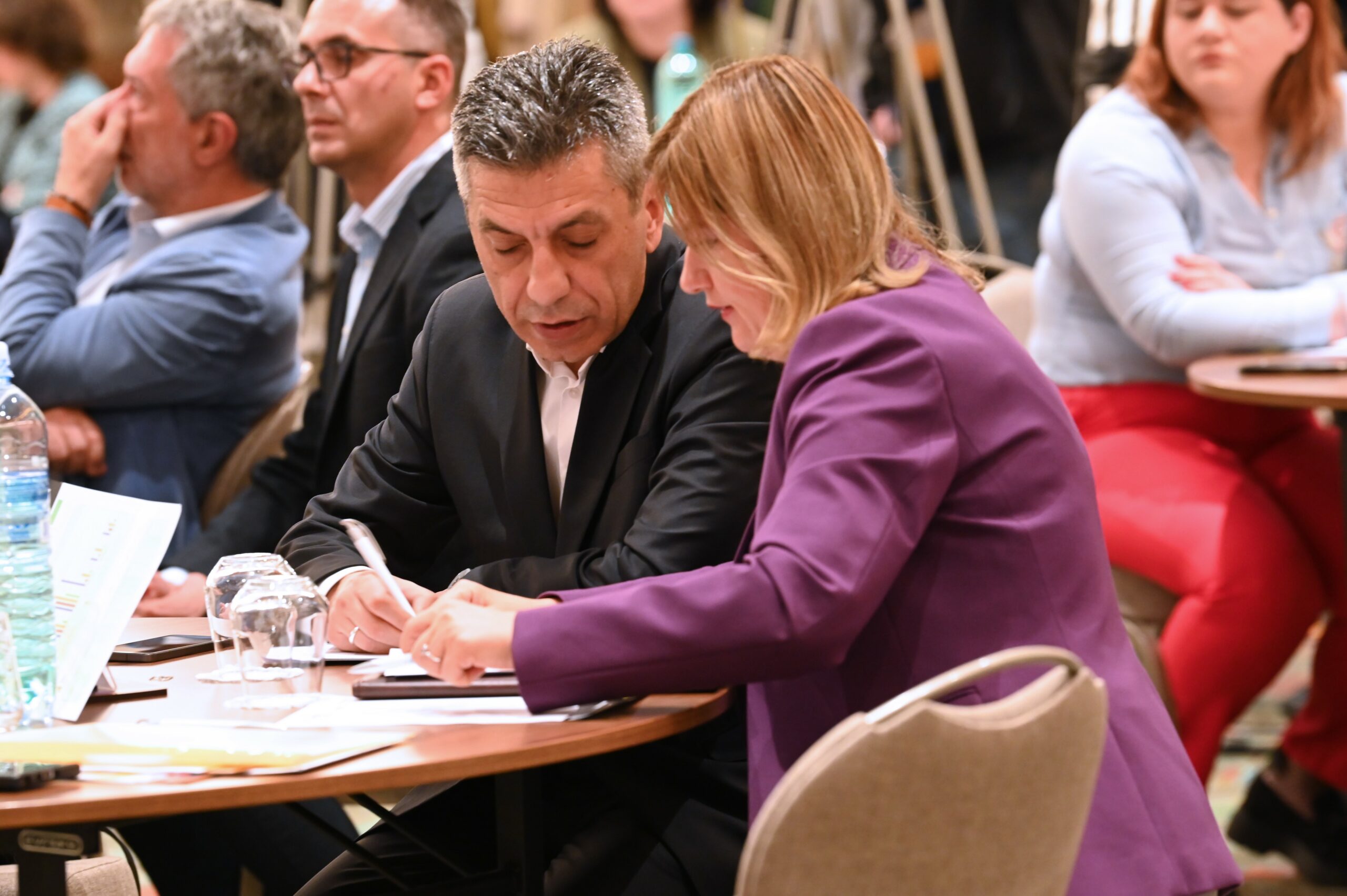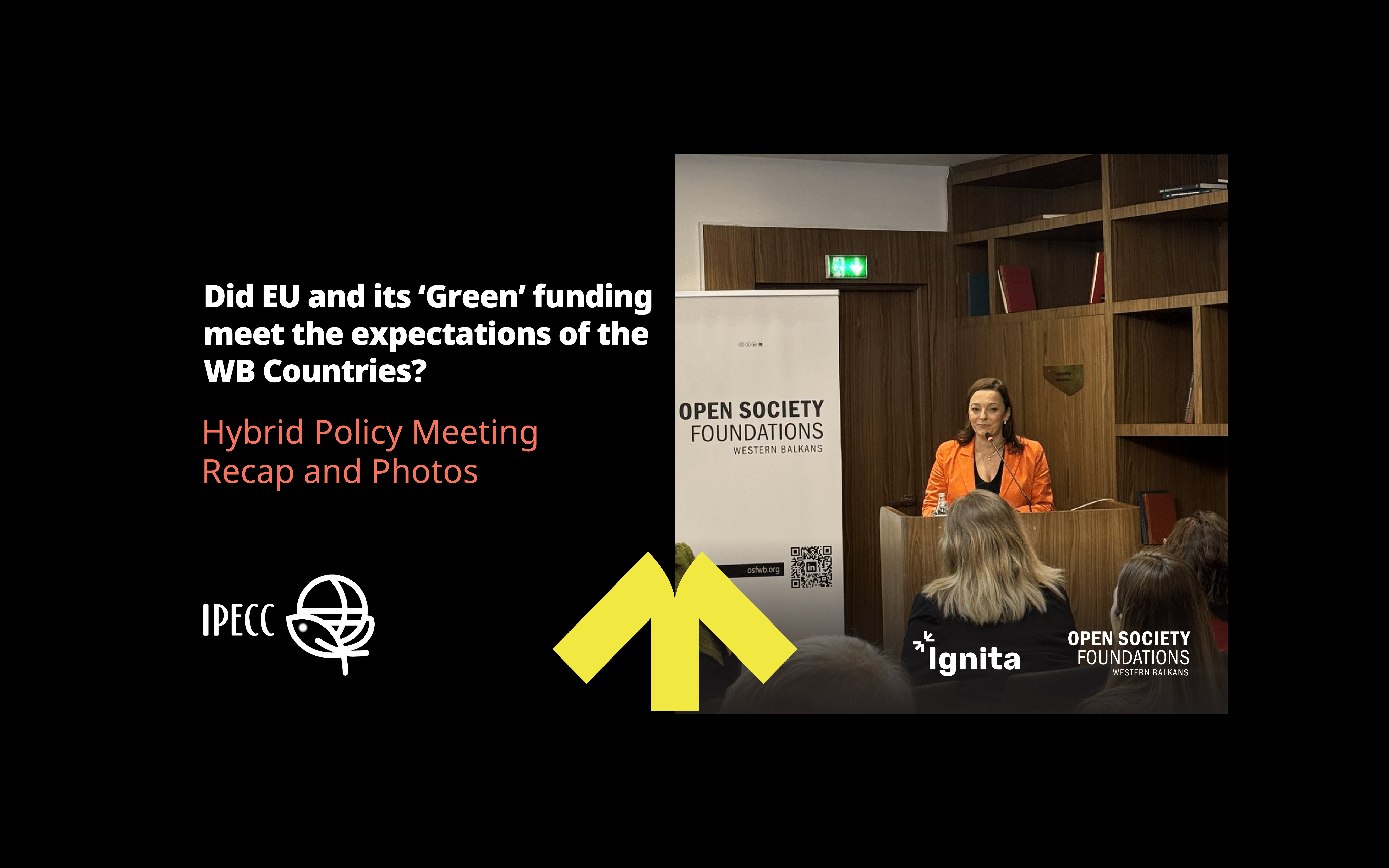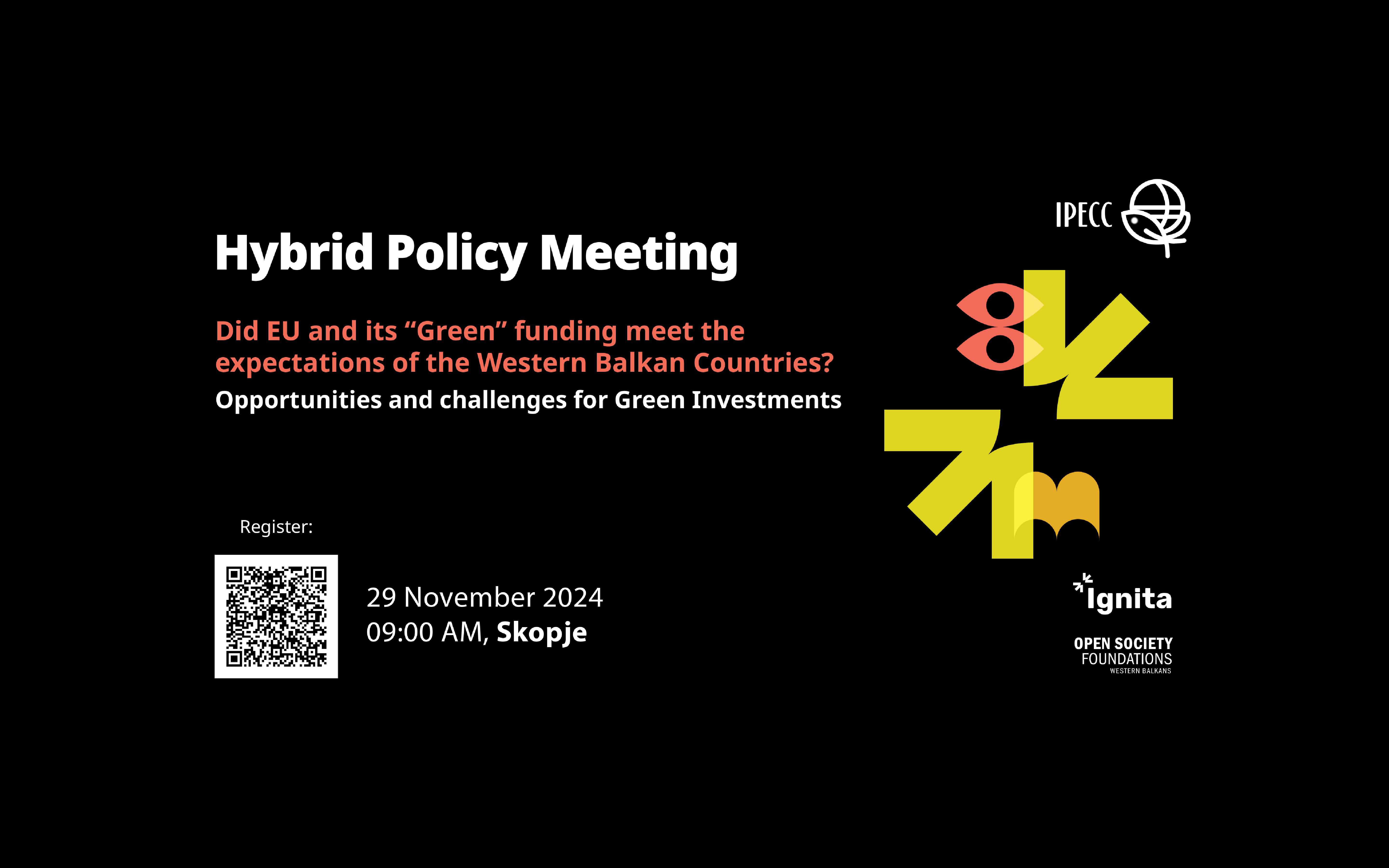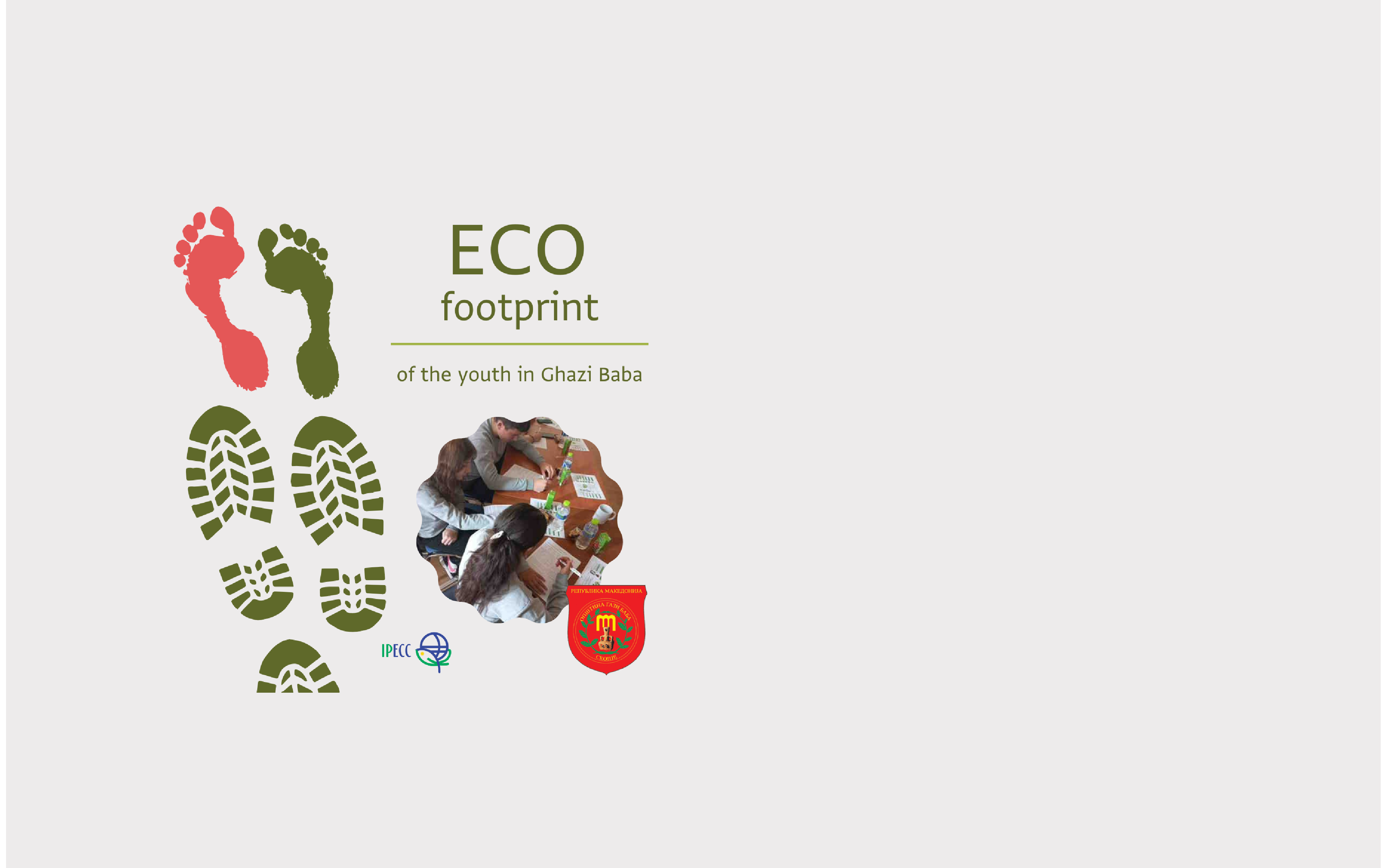The thematic working group (TWG) for “Climate and Green Agenda”, as part of the Forum for Civil Society and Think Tank Organizations for 2023 (CSF) within the framework of the Berlin Process, held its first thematic consultation meeting on September 4th, dedicated to “Green infrastructure investments” organised by the Institute for Good Governance and Policies in Environment and Climate Change (IPECC) from Skopje, North Macedonia.
The consultation meeting held with the participation of 31 experts, representatives from various institutions and CSOs from WB6 countries signifies cooperative effort aimed at exploring and addressing various aspects and potential opportunities and benefits associated with the green investments in WB6 and their potential impact to influence the region’s sustainable development. Several fundamental aspects that are essential for understanding the importance of Investments in Green Infrastructure for the Western Balkan Countries (WB6), their significance in the every-day life of citizens, the impact they have on the economies of the WB6 and for the EU accession process of WB6 were discussed.
The meeting was addressed by the moderator Jadranka Ivanova, president of IPPEC, rapporteur Radica Koceva, IPA management expert and panellist Gill Kitell, Team Leader – Instrument for Pre-Accession, Enlargement Negotiations and EUSAIR, DG Regio, Evgenija Serafimovska Kirkovski – Head of Department, Secretariat of European Affairs, NIPAC office, North Macedonia, Johannes Heidecker, advisor to the Prime Minister of North Macedonia for economic issues, Ljupka Siljanoska – Deputy Director at Transport Community, Ministry of Transport and Communications of RNM, Sabina Lalaj – Local Legal Partner, Deloitte Office in Tirana, Albania and Stela Ademi – Project Manager, Cooperation and Development Institute, Tirana, Albania.

While participants agreed that investing in green infrastructure is a way forward to economic growth and wellbeing of citizens by creating improved living conditions and fostering a sustainable environment, they have also agreed that there are numerous significant issues still challenging the WB6 countries in implementing green infrastructure.
One of the main challenges is the significant disparity between the green investment requirements for all WB6 countries to align with the EU acquis requirements for Chapter 27 and the Green Agenda and availability of financial sources, primarily channelled through the Instrument for Pre-accession (IPA). Furthermore, an additional challenge lies in the fact that even the available funds are not fully utilized due to the inadequate administrative capacity of national authorities. Additionally, loans remain predominant in the external financing landscape for investments across all the WB6 countries, exerting economic pressures and failing to effectively stimulate investments in green infrastructure.
A potential solution could be to explore the option of EU granting to be based on solidarity and with operational modus of that of European Structural and Investment Funds to WB6. This could offer substantial financial support and promote convergence, although accompanied by challenges related to capacity and compliance with EU standards. WB6 countries face challenges in efficiently utilizing the funds due to administrative capacity limitations, which could further exacerbate delays in implementation and potentially increase the amount of unspent funds. Balancing these factors would be essential to ensure effective utilization of the funds and facilitate the sustainable development in the region.
Regional cooperation in green infrastructure projects while consolidating efforts through developing absorption capacity, promote synergies and avoid duplication of projects can be a way forward for WB6 countries. The creation of a Regional Hub for Infrastructure, encompassing both conventional and green initiatives, presents a promising approach to streamline project management and foster sustainable development in the region.
In this context it was stressed that Western Balkans Investment Framework-WBIF, a joint initiative of the EU, financial institutions, bilateral donors and beneficiaries, already offers the regional perspective and cooperation, but we must not forget that all WB6 countries struggle with basic domestic infrastructure such as waste management, water treatment, flood and fire resilience, etc.
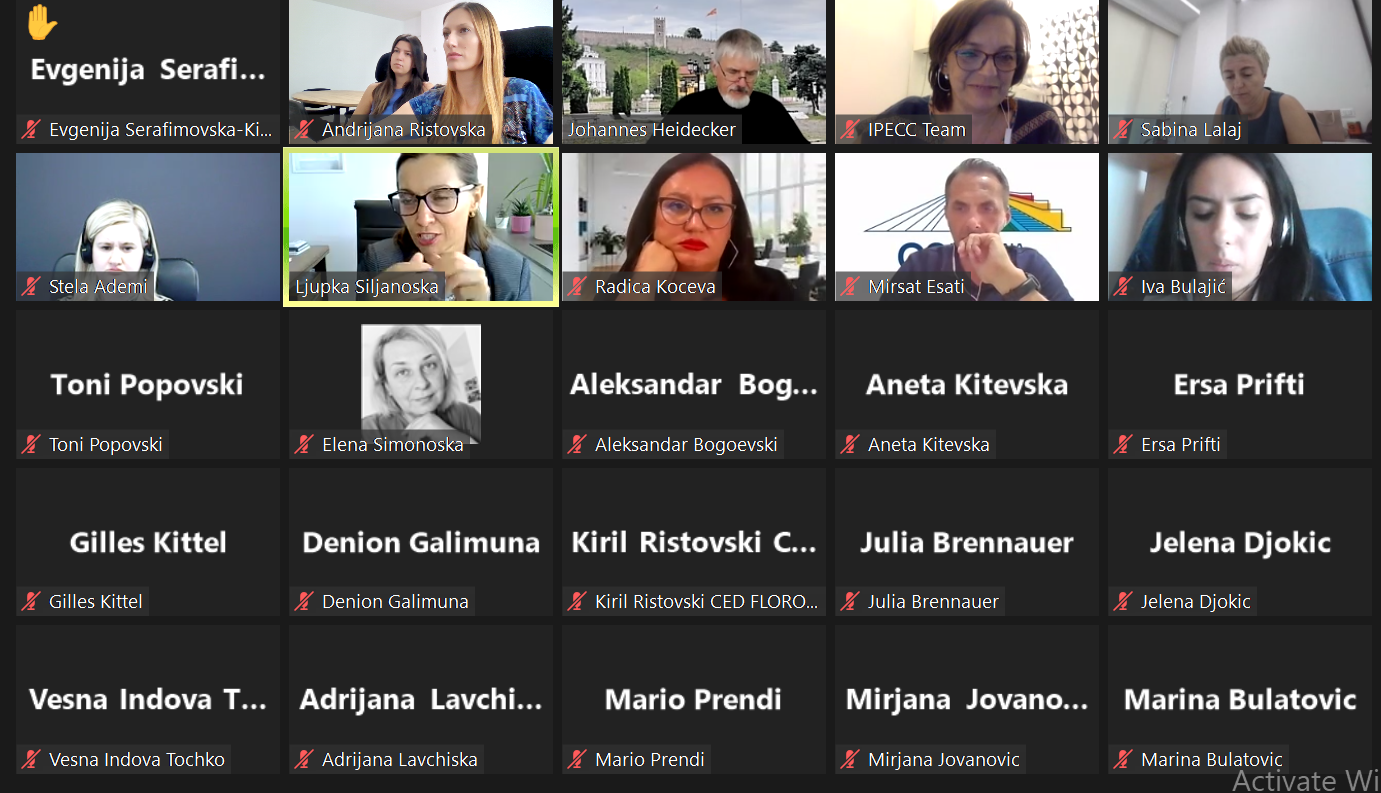

In terms of appropriate planning participants agree that there are numerous strategies, but lack of interconnection is evident. The strategies should be planned on a sector level, rather than on the narrow responsibilities of the ministries. Even more so, WB6 countries must have long term national development plans in order to probably further plan and address the interconnected issues.
There was a unanimous agreement during the panel discussion that principle and perhaps the most urgent actions should be directed towards resolving the deficiency in administrative capacities. Specifically, there is a need for a pool of skilled and knowledgeable personnel who possess the capability to design and execute green infrastructure projects effectively. Furthermore, these capacities should foster a work culture within the WB6 public administrations that is result-oriented, geared toward problem-solving, and committed to promoting ownership. This approach is pivotal for enhancing the absorption of EU funds while simultaneously advancing other critical objectives, including economic growth, environmental improvement, and the well-being of citizens.
Transparency is also crucial, not only in the programing of funds, but also in the implementation of the projects funded either from national, either from international funds such as EU. Transparency is a critical element that could enhance the accountability, which is essential for understanding the real cause of unsuccessful projects. It helps shed light on whether issues stem from bureaucracy, lack of capacities, or even instances of corruption.
Finally, another way that could significantly enhance the overall promotion of green infrastructure is bolstering green investments in the private sector. To achieve this, the governments of the WB6 countries should establish a favourable environment and implement measures to support and encourage green infrastructure initiatives within the private sector. In this way, both the public and private sectors, being overseen by the civil society, can collaboratively undertake responsible actions to advance green infrastructure.
The Institute for Good Governance and Policies in the Environment and Climate Change – Skopje (IPECC) leads the TWG “Climate and Green Agenda”. This TWG concentrates its consultation efforts on “Green Infrastructure Investments”, while also giving due attention to “Good Governance in Environment” and “Biodiversity and Protection of Natural Resources”.
The Open Society Foundations – Western Balkans (OSFWB), mandated by the Government of Albania as the current holder of the Presidency of the Berlin Process, and in collaboration with the Hellenic Foundation for European & Foreign Policy (ELIAMEP) and with the Cooperation and Development Institute (CDI), is organizing this year’s Civil Society & Think Tank Forum (CSF). The CSF, organized as part of the Berlin Process Summit to be held in October 2023 in Tirana, aims to foster regional cooperation, strengthen EU-related reforms and support the accession process of the Western Balkan countries.



